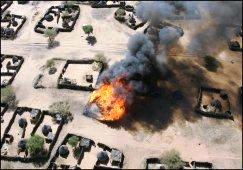Darfur rebels say govt attacks as UN vote nears
Aug 31, 2006 (KHARTOUM) — Darfur rebels said Sudanese planes and troops attacked villages in the western region ahead of a U.N. Security Council vote on Thursday on the deployment of U.N. peacekeepers to the region.
 Rights groups and Washington have accused Sudan’s Khartoum-based government, which opposes the U.N. troop deployment, of a huge military build-up in recent weeks.
Rights groups and Washington have accused Sudan’s Khartoum-based government, which opposes the U.N. troop deployment, of a huge military build-up in recent weeks.
The rebels said the new offensive began two days ago as government forces attacked and occupied Kulkul about 35 km (22 miles) north of Darfur’s main town el-Fasher.
“Government forces have moved north of Kulkul with about 90 vehicles and are attacking the area of Um Sifir, bombing with Antonov planes,” said Jar el-Neby, a rebel leader from a faction which did not sign a May peace deal.
A Sudanese armed forces spokesman said the army did have forces in Kulkul but that the area had always belonged to them.
“There are no new operations. Only before many days to confront an attack by the (rebel) National Redemption Front (NRF),” he added.
The NRF are a new alliance of rebels who did not sign the May deal and whom the government has branded as “terrorists” after their decision to renew hostilities.
Although the Security Council intends to vote on the U.S.-British-drafted resolution to create a United Nations peacekeeping force, troops will not be deployed without consent from the Khartoum government.
So far Sudan has refused to allow the United Nations to replace or absorb an African Union force in Darfur, which has only enough money to exist until its mandate expires on September 30 and has been unable to stop the humanitarian crisis in the lawless west of the country.
AU FORCE STRUGGLING
Escalating violence has reduced aid access in Darfur to its lowest level since the conflict began 3-1/2 years ago. Another aid worker was confirmed killed in Darfur bringing the total to 12 deaths since a May peace deal was signed.
The world’s largest aid operation with 14,000 workers helping 2.5 million people in camps is under threat in Darfur with the latest death of a national staff member of the International Comittee for the Red Cross (ICRC) east of the mountainous Jabel Marra area.
“The ICRC is shocked by his death, which comes amid a deterioration in security conditions in Darfur that has claimed the lives of other humanitarian workers in recent weeks,” it said in a statement sent out late on Wednesday.
Around 7,000 African Union forces are struggling to stem the violence, called genocide by Washington. But running out of cash and short on equipment and experience they have come under attacks from rebels, militia, and even the civilians they are supposed to protect.
Many in Darfur reject the AU-brokered May accord, signed by only one of the three negotiating rebel factions and rejected by tens of thousands in Darfur. Some say the AU is no longer impartial since the deal.
The AU supports international attempts to arrange a U.N. takeover of their mission, but Khartoum’s dominant National Congress Party refuses, calling it an attempt at Western colonialism.
Opposition politicians mostly support U.N. transition in Darfur and say the NCP fears U.N. troops will arrest officials likely to be indicted by the International Criminal Court investigating war crimes allegations in the region.
“It is now clear that the wrangling over the deployment of international forces has turned into a confrontation between the Sudanese people and foreign parties,” said the state-owned Sudan Vision paper in an editorial on Thursday.
The vote on the resolution, which can be delayed until Friday if any of the 15 U.N. Security Council members request it, calls for up to 22,500 U.N. troops and police officers and an immediate injection of air, engineering and communications support for the 7,000-member African force.
Council members predict 13 nations will vote in favour. Qatar, the only Arab member, is expected to vote “No” while China, which has close government ties, may abstain.
Tens of thousands have been killed in Darfur since mostly non-Arab rebels took up arms accusing Khartoum of marginalising the area.
(Reuters)
